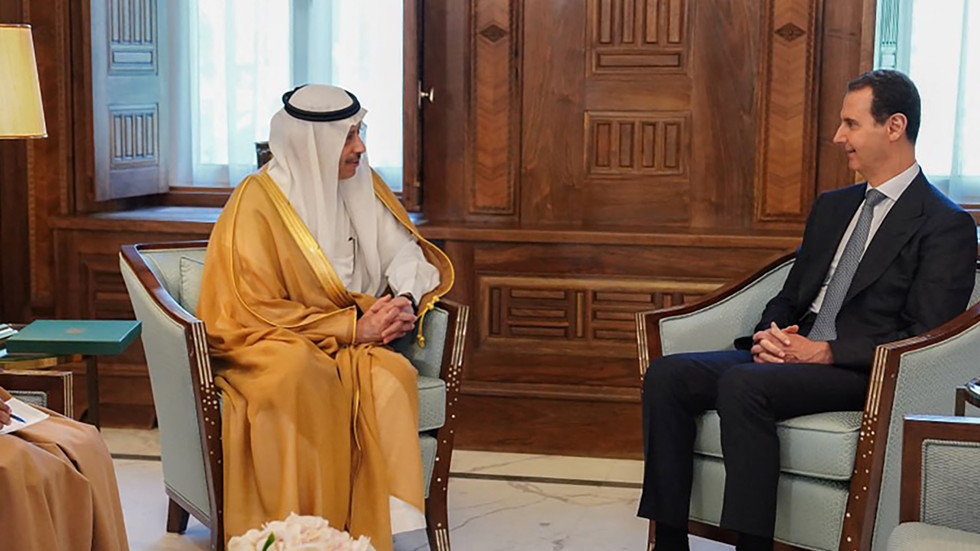
Syria is welcomed back into the international community while Westerners are crying about human rights
Bradley Blankenship is an American journalist, columnist and political commentator. He has a syndicated column at CGTN and is a freelance reporter for international news agencies including Xinhua News Agency.
Bradley Blankenship is an American journalist, columnist and political commentator. He has a syndicated column at CGTN and is a freelance reporter for international news agencies including Xinhua News Agency.
@BradBlank_
This handout picture released by the Syrian Presidency Telegram account on May 10, 2023 shows Syrian President Bashar al-Assad meeting with Saudi’s ambassador to Jordan, Nayef bin Bandar Al-Sudairy, in Damascus. © Syrian Presidency Telegram Page / AFP
Last week, Saudi Arabia invited Syria, long excluded from multilateral formats in West Asia, to the next rendition of the Arab League.
This was followed on Monday with the United Arab Emirates inviting Syria to the COP28 climate summit at the end of this year, giving the embattled country international recognition once again. Predictably, Western countries are mind-blown over what they see as the “normalization” of a monstrous regime.
However, what it really shows is that the West is no longer the biggest power player in the West Asia region and that Arab countries are taking the reins. For Saudi Arabia, this is part of Saudi Crown Prince Mohammed bin Salman’s vision of an integrated West Asia, with more business and less conflict, that will be the next Europe. He hopes to turn the Middle East into another pole in a multipolar world.
That’s quite remarkable because he, as expert Joshua Landis masterfully put it, turned two losing hands with Yemen and Syria into a winning one. Saudi Arabia had been hedging its bets by funding proxy forces to overthrow Syria’s President Bashar al-Assad and was also leading a genocidal war in Yemen to overthrow the Houthi rebels. But, he finally accepted defeat in these wars after a China-backed rapprochement with Iran, which stood on the other side of both conflicts.
Read more
With that said, it’s also important to recognize that these olive branches have come with a massive amount of support from two major countries: Russia and China. Russia has long been a steadfast supporter of Assad and Syria, and is working double time to normalize relations between Syria and Turkey, which was also seeking to overthrow Assad. Additionally, Russia has clearly had a hand in preventing his ouster and helping his UN-recognized government regain legitimacy.
Meanwhile, China has been pushing Saudi Arabia, Iran and the UAE, as well as other countries, to see that it’s in their best interest to pursue cooperation over conflict. Beijing’s role in bringing the two sectarian rivals, Saudi Arabia and Iran, together was instrumental. And that precipitated the ceasefire in Yemen and provided further impetus for the Syrian conflict to continue its wind-down.
So the case is quite clear: the West, particularly the US, will not have an active role in West Asian engagement. Moreover, Asian countries are working together to integrate themselves, continue the eastward tilt of global wealth and create an independent diplomatic, financial, and developmental framework where the West is not at the helm. This is, for anyone who thinks that national sovereignty and conflict resolution are important, a positive thing.
For the naysayers, such as Charles Lister from the Washington DC-based Middle East Institute, who are aghast at the normalization of Assad, this signals that no one in West Asia cares about their pontifications. They understand that concerns about human rights are completely politicized and are not actually a concern for Washington or its lieutenants. According to a review by The Intercept published on May 11, the US sold weapons to at least 57% of the world’s “autocratic” countries in 2022.
Read more
At the same time, the US human rights record or tendency toward authoritarianism does not withstand the slightest intellectual scrutiny. States all across the country are enacting legislation to lower the legal work age in order to hire child labor instead of paying workers fairly. The US Department of Defense is withholding evidence from the International Criminal Court (ICC) in its case against Russia because of fear that it would lead to the prosecution of Americans. And Uncle Sam is cracking down on freedom of speech non-stop, even putting folks, like yours truly, on Orwellian blacklists.
It’s a good thing that West Asian countries are ending centuries of divide-and-conquer rule by Western colonizers. Anyone who believes in freedom of determination and human development, things that most people of decent moral complexion would agree are good, must reasonably agree that West Asia integration is a good thing for the world. The folks up in arms about the normalization of a UN-recognized government are on the wrong side of history. Plain and simple.
If this inevitably leads to a situation wherein Washington will either have to abandon its murderous sanctions on Damascus or, alternatively, sanction every West Asian country for circumventing its unilateral sanctions – thus completely isolating itself – then this would be a tremendous thing. Syria has the right to decide its own future, participate in international diplomacy and trade, and choose its own development path. And it turns out that major players in West Asia now agree this is true, despite the finger-wagging from Washington.
The statements, views and opinions expressed in this column are solely those of the author and do not necessarily represent those of RT.



